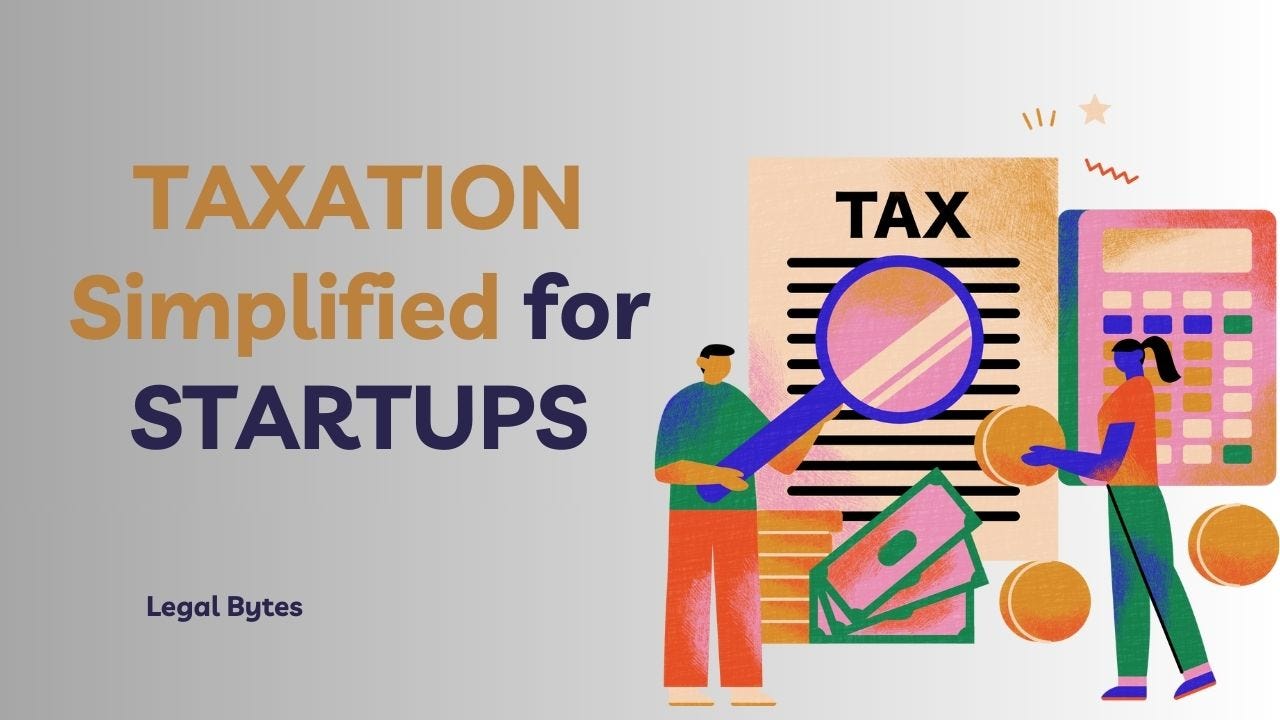Simplified TAX COMPLIANCE for Startups
Take the pain and confusion out of taxation with these simplified strategies for founders
Early-stage tax compliance makes your business investor-ready, prevents legal troubles, and positions you for government incentives.
Unfortunately, many Nigerian startups operate informally without registering for tax compliance. Oftentimes, they’re not to blame as there is a ton of limited knowledge on the topic of corporate taxation in Nigeria. But, neglecting tax compliance as the business grows and attracts investors can become a major red flag.
Consequences of Non-Compliance:
Heavy Fines & Back Taxes: FIRS (Federal Inland Revenue Service) can impose penalties for late tax filings or failure to register.
Ineligibility for Operational Licences, Government Grants & Incentives: Many startup funding opportunities like CBN’s intervention funds or Bank of Industry loans, require tax compliance without which your startup becomes ineligible. Also, when applying for any operational license, evidence of tax compliance (that is, your tax clearance certificate [TCC]) is mandatory.
Loss of Investor Confidence: Investors check tax records before funding. Unpaid taxes can be a deal-breaker.
Business Disruptions: The government can shut down operations for non-payment (e.g., FIRS sealing non-compliant businesses).
Key Tax Obligations for Startups in Nigeria
As a Nigerian startup, the major tax requirements you need to comply with include:
1. Corporate Income Tax (CIT)
Who pays? Every registered company in Nigeria (except those exempted).
Rate:
Small businesses (less than ₦25M annual revenue) – 0% (Exempted)
Medium businesses (₦25M – ₦100M annual revenue) – 20%
Large businesses (above ₦100M revenue) – 30%
Filing Deadline: Annually, within six months of your financial year-end.
Startups earning below ₦25M per year are CIT-exempt, but they still need to file tax returns (NIL) to obtain a tax clearance certificate and maintain compliance.
If you’re a medium-sized business (₦25M – ₦100M annual revenue), you can maximize tax returns by deducting allowable business expenses like operational expenses (eg. rent, salaries), capital allowances (furniture, machinery), tax-exempt income, unrelieved losses, loans, allowable tax credits, etc.
2. Value Added Tax (VAT)
Who pays? Any business selling goods or services with annual revenue above ₦25M.
Rate: 7.5% on goods & services
Filing Deadline: Monthly, on or before the 21st day of the following month.
VAT is a consumption tax levied on the goods and services consumed by any person whether corporate or individual, and unless an item is specifically exempted by law, the consumer is liable to the tax. Therefore, even if your startup earns below ₦25M and is VAT-exempt, you should still track VAT records to avoid future issues when your revenue grows.
3. Pay-As-You-Earn (PAYE) Tax (for Employees)
Who pays? Every employer deducts tax from employees’ salaries & remits to the state tax authority.
Rate: Graduated scale (7% – 24%) based on employee earnings.
Filing Deadline: 10th of every month.
Even if your team is small, registering for PAYE early prevents issues when scaling.
4. Withholding Tax (WHT)
Who pays? Companies deduct tax when making payments to vendors (contractors, consultants, suppliers) for the supply of goods or services.
Rate: 2% – 15% depending on the transaction and the status of the recipient/service provider, whether non-corporate entity/individual or corporate entity.
Filing Deadline:
Monthly, on or before the 21st day of the following month, for filings to the FIRS.
For relevant State Internal Revenue Service, not later than the 30th day of the month following the month of the payment.
In the case of deductions in respect of pay as you earn or capital gains tax, not later than the 10th day of the month following the month of the payment.
Many startups forget this, but failing to file withholding tax leads to penalties. This is because withholding tax is not a separate type of tax but an advance payment of income tax (it’s used as a tool to curb income tax evasion) and it is available as a set-off against future income tax assessments.
Small companies (that is, companies with annual turnover below NGN25 million) and unincorporated entities of similar attributes are not permitted to deduct tax at source from any transaction if the
supplier/recipient has a valid tax identification number (“TIN”); and
the value of the transaction is NGN2 million or less in the relevant month.
This is to reduce the compliance obligation on small companies. Where these conditions are not met, the small company/unincorporated entity making the payment will need to deduct the tax at the applicable rate and remit the amount deducted to the relevant tax authority (“RTA”). Individuals are not permitted to deduct tax.
5. Personal Income Tax (For Sole Proprietors & Founders Not on Payroll)
If you run a business as a sole proprietor (without incorporation), you pay Personal Income Tax (PIT) instead of Corporate Tax.
Rate: Graduated scale (7% – 24%) based on income.
However, there is a minimum income tax provision stipulating that if a taxpayer has no taxable income, a tax rate of 1% is applied to the total income.
Common Tax Mistakes by Startups (and How to Avoid Them)
Mistake 1: Thinking You’re Too Small for Taxes
Even if your startup is tax-exempt now (below ₦25M revenue), you must still file returns. The solution is to register for a Tax Identification Number (TIN), verify it with the FIRS’ TaxProMax, and submit NIL returns to FIRS to avoid fines.
Mistake 2: Ignoring VAT Until It’s Too Late
Some startups forget to register for VAT when revenue exceeds ₦25M and get hit with penalties. The solution is to track revenue and expenditure, register before exceeding the threshold, and submit NIL returns, where applicable, to avoid threats of non-compliance.
Mistake 3: Not Keeping Proper Records
Many startups don’t track invoices, tax deductions, or receipts, leading to tax disputes. The easy solution is to use accounting software (e.g., QuickBooks, Wave) to automate tax tracking.
Mistake 4: Not Filing Tax Returns
Even if a startup makes no profit or is exempt from specific tax deductions, failing to file annual tax returns attracts fines and poses future problems. The solution is to submit NIL returns when necessary.
Mistake 5: Poor Tax Planning
Startups that don’t optimize tax deductions (e.g., allowable business expenses and other exemptions) end up paying more than necessary. The solution is to work with a tax professional for tax-efficient strategies.
Tax Efficiency Strategies for Nigerian Startups
You can legally reduce your tax burden and stay tax-compliant by doing the following;
Take Advantage of Tax Exemptions & Incentives
If revenue is below ₦25M, file returns but pay 0% corporate tax
If eligible, register for the Pioneer Status Incentive (PSI). It grants up to 5 years of tax exemption for qualified startups.
Leverage government incentives like Startup Act incentives and Bank of Industry (BOI) tax reliefs.
Deduct Business Expenses Properly
Claim deductions on business costs (rent, salaries, marketing, equipment), capital allowances, and other allowable deductibles and incentives.
Keep records of all business expenses for proper tax planning.
Structure Your Business for Tax Efficiency
Some startups save on taxes by using holding companies in tax-friendly jurisdictions
Setting up an offshore company (e.g., in Mauritius or Delaware) can help with tax optimization (if structured properly).
Incorporating in a country or jurisdiction that operates a territorial tax system
Use Tax Professionals for Compliance & Planning
A tax advisor can help reduce liabilities and avoid penalties.
Consider hiring a tax consultant once revenue grows.
Final Takeaways & Action Steps
What should startups do now?
Register for a Tax Identification Number (TIN) and verify it with the FIRS’ TaxProMax, if not done already. This verification gives you access to and creates a profile for you on TaxProMax, which is a self-service online tax administration platform or portal that enables taxpayers to manage taxes, file tax returns, pay taxes, process and validate Tax Clearance Certificates, etc.
Track revenue & expenses (use accounting tools for easy tax filing).
File VAT, WHT, PIT, PAYE, CIT, and any other applicable tax on time to avoid penalties.
Take advantage of tax incentives available for Nigerian startups.
Consult a tax expert once revenue grows to optimize tax strategy.
About Legal Bytes
We are Adune Legal’s weekly Newsletter, which simplifies the Law for Busy Executives, Entrepreneurs, and Tech Enthusiasts interested in the legal aspects of Business, Technology, and Intellectual Property.
We love emails from our readers— reply to this email and let us know your thoughts and suggestions.
WAIT!!!
Become a paid subscriber and access;
Q&A sessions with Nneoma Grace via chats on Substack.
Detailed Legal Templates and examples to save you time and legal fees
Expert Interviews and Case Studies
Don't miss out on these perks - subscribe today and start enjoying it!
Thanks for reading Legal Bytes
Adune Legal’s Team
P.S. Like Legal Bytes? Please forward us to a friend.
P.P.S. Was this publication forwarded to you? Sign up here & see previous publications.





